
A resume reflects your personality and thus needs to be structured carefully. It is the abstract of your past and a lead to your future, which the firm analyzes to match your compatibility with the respective designation.
Constructing an appropriate resume is the holy grail, especially filling certain sections. From this perspective, job applicants usually walk a tightrope in adding good skills to their resumes, which is the preferred part of the interview panel of a firm.
To help you avoid such a situation, here are the best skills to put on a resume to guarantee your selection in 2025.
What are the Best Skills to Put on a Resume for a Guaranteed Selection?
The best skills to put on a resume are the skills that you can validate and that will help you fetch good marks in an interview. Some of them are mentioned as follows:
- Communication skills
- Leadership
- Time Management
- Adaptability
- Creativity
- Delgraiton
- Resource management
- Critical thinking
- Business development
- Project management
Designing a resume is a talent that requires a thorough understanding to structure the best one. Its skills section is what catches the eye of the interviewers. However, 95% of the people fill in odd skills and fall into the spiral of counter-questioning during the interview.
To handle such situations effectively, here we have some of the best skills to put on your resume to make an indelible impression on the interviewing panel.
Best 24 Skills to Put on a Resume
Although the skills to be put on the resume vary from person to person. However, certain qualities can be utilized in the section to put a strong impression on the interview panel. To help you out in this process, here we have some skills exhibited below that you can consider adding to your resume.
1. Communication Skills
In simple terms, it is the ability to convey information effectively to others. It incorporates various methods of interaction, which include written, visual, verbal, and non-verbal communication.
2. Leadership
Leadership isn’t a monotonous quality; rather, it is a cumulative blend of several other characteristics. It includes decision-making, impactful communication, and relationship building. Besides, it also encompasses integrity, adaptability, motivation, active listening, demonstrating fortitude, leading the team, and managing conflict resolution.
3. Management Quality
There is an immense demand for management skills in corporations to target the complex goals, achieve the objectives, ensure coordination between stakeholders, and sustain a positive work culture. It is an amalgam of technical skills, conceptual expertise, and interpersonal qualities.
4. Creativity and Innovation
This skill is highly admired in the corporate sector for generating new product ideas, enhancing processes, and discovering novel solutions to problems. Inculcating and brushing it can give you an unmatchable edge in the working culture at the firm.
5. Adaptability
An adaptable personality can imbibe the changing corporate culture, adjust to the new rules, and also calibrate to the surroundings. Such versatile, resilient, and flexible employees can flow with the changing scenarios of the firm and hence are a valuable asset.
6. Time Management
It typically means planning the goals, prioritizing the objectives, and executing the tasks to achieve the targets. An effective utilization of time is necessary in managing multiple tasks and achieving the objectives in accordance with decided timelines.
7. Active Listening
Paying close attention to the key details in a conversation, grasping the intent of the message, and responding thoughtfully is what is broadly encompassed in active listening. It is one of the most critical qualities sought by a firm in its employees.
8. Problem-solving
An employee with problem-solving skills catalyzes the working process without any hassles or interruptions. It incorporates brainstorming solutions, analyzing the various dimensions, reaching the most appropriate approach, and implementing it. All these sub-skills keep good decision-making at the center.
9. Delegation
Delegation is one of the best skills to put on a Resume, involving allocating duties and tasks to worthy members. It further fosters teamwork, improves coordination, and reduces the time elapsed in executing the plan. This skill includes understanding the strengths and weaknesses of the teammates, facilitating clear communication, managing time, and providing productive feedback.
10. Project Management
In the corporate sector, project management involves structuring the project process and methods, segregating the resources, and applying requisite skilled human resources to achieve the prospective goals in the stipulated time.
11. Organizational Skills
It deals with managing time, tasks, and resources effectively to reach the target. People possessing it are good at prioritizing objectives, planning strategically, thinking analytically, paying attention to details, and coordinating between different collaborators.
12. Critical Thinking Abilities
In fundamental terms, it involves in-depth and objective analysis of available information, identifying the variations and structuring a reasoned inference, making it one of the best skills to put on a resume.
13. Research
During situations of superficial and unexplained orders, researching, gathering information, analyzing, and interpreting it is necessary to trace out the way forward. Here, the skill of thorough research comes into play. Data collection, information analysis, critical thinking, and problem solving are an inherent part of this skill.
14. Detail Oriented
The quality of understanding the minor details, reading between the lines, and paying attention to the slightest error and rectifying them is highly appreciated. Such a sharp eye is always required to keep the conversation and documents free from blunders.
15. Business Development
It is one of the most sought-after skills in the corporate field, which deals with networking, strategic planning, market research, etc., to accelerate business growth.
16. Data Warehousing
This hard skill enables storing, organizing, and analyzing large amounts of data to ensure informed and objective decision-making. It involves extracting, changing, and loading the data and information across the systems.
17. CMS
CMS stands for Content Management System, which involves content creation and management, and also deals with its marketing. In general terms, it is a software program that facilitates creating and managing digital content on websites and other internet platforms.
18. Content Writing
Content writing is an effective skill for communicating distributed content at a single point, along with ensuring its accuracy and authenticity. This skill involves translating the wider and complex concepts and information into a legible and understandable form. With the popularity of digital marketing, it has become a vogue.
19. Statistical Analysis
This skill incorporates analyzing the data in statistical form to identify trends and patterns to extract meaningful inferences and conclusions. It incorporates the collection, exploration, and presentation of the bulk data to derive understandable patterns and draw meaningful inferences.
20. Email Marketing
It is composed of some hard and soft sub-skills, such as creative thinking, copywriting, understanding the email structure, and building social networks. It is a direct marketing strategy to promote any particular product or service through commercial messages.
21. Web Analytics
Web analytics is one of the most in-demand skills to understand user behavior, optimize the website accordingly, and make data-based decisions. The candidate versed in this skill is proficient in collecting and analyzing the website visitors’ trends and patterns and further strives to optimize website usage.
22. Accounting
Accounting is another best skill to put on a resume, which encompasses technical and soft skills that involve bookkeeping, managing budgets, keeping book records up to date, examining monetary details, and preparing financial statements. These days, it is one of the most sough skills in almost every firm.
23. AI
Being one of the emerging technologies, having experience in AI, such as machine learning, Generative AI, Prompt engineering, etc., can magnify your selection chances. The emerging demand for integrating AI and using tools integrated with it has proportionally increased the demand for candidates proficient in this skill.
24. Software Development
The applicant acquainted with software development is preferred over others as they remain adept at handling and improving the firm’s applications, software, and programs. As every business is going digital, the demand for candidates with this skill has also increased.
The aforementioned skills are categorized as soft skills and hard skills based on their nature and qualification. This distinction needs to be understood holistically before moving further in the discussion.
What are Soft Skills?
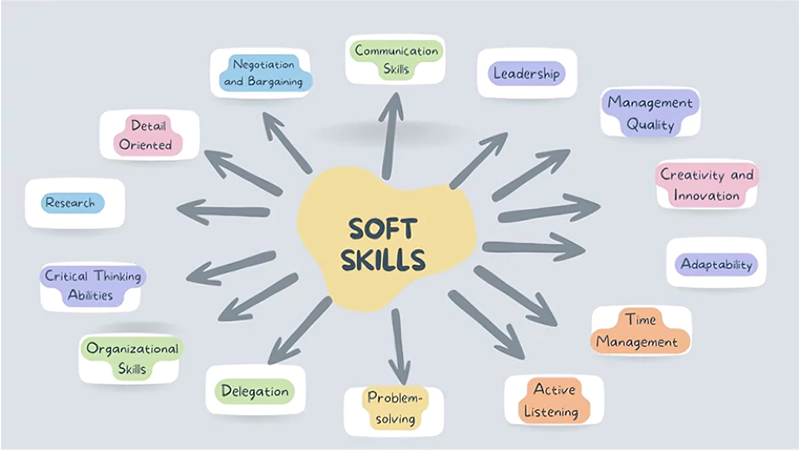
These are the general skills that are sought in a candidate during an interview. Also dubbed as transferable qualities, these skills are more of a psychological root that are developed by socialization and enculturation over time.
To give you a better understanding, here we have a graphical representation of some of the most in-demand soft skills to put on a resume.
Valuable soft skills include:
- Communication (verbal and written)
- Teamwork and Collaboration
- Problem-Solving
- Time Management
- Adaptability
- Leadership
- Emotional Intelligence
- Critical Thinking
Now, let’s understand the hard skills to get a better idea about the topic under discussion.
What are Hard Skills?
Hard skills are some of the best skills to put on a resume that are specific and measurable, in contrast to soft skills. These are readily learnable and presentable, as they depend on the knowledge and qualifications.
When it comes to the job application, these skills can also glitter up your resume and can be a game-changer in the interview as well.
As these skills are job-specific, here are some prominent examples and their brief explanation to give you an idea about them.
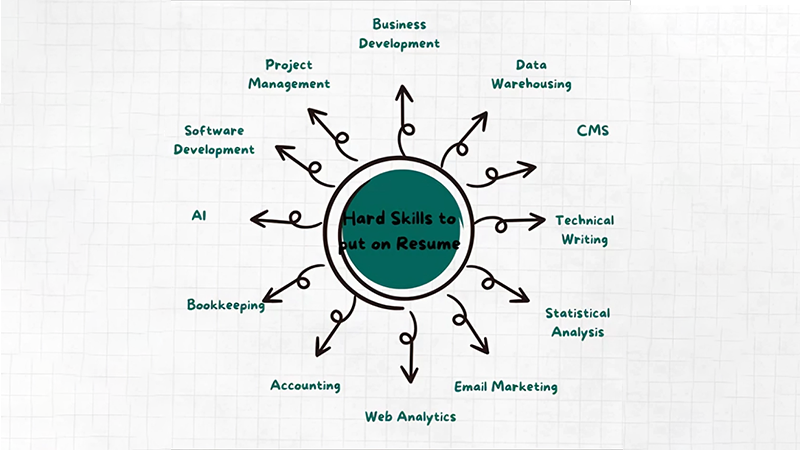
To get an in-depth understanding of these two prominent types of skills, it is imperative to explore the differences between them, which are discussed next in the sequence.
Here are some high-demand hard skills across various industries:
- Data Analysis (e.g., Excel, SQL, Python)
- Project Management (e.g., Agile, Scrum, Trello, Asana)
- Software Proficiency (e.g., Microsoft Office Suite, Adobe Creative Cloud, QuickBooks)
- Programming Languages (e.g., Java, JavaScript, C++, HTML/CSS)
- Foreign Languages (e.g., Spanish, Mandarin, French)
- Digital Marketing (e.g., SEO, Google Analytics, social media tools)
- Graphic Design (e.g., Photoshop, Illustrator, Figma)
Difference Between Soft Skills and Hard Skills
While discussing the best skills to put on a resume, we need to understand the fundamental difference between soft and hard skills to infer their true essence. Here is a tabulated comparison between them.
| S. No. | Differences | Soft skills | Hard Skills |
| 1 | Pseudonym | Social or interpersonal skills | Technical skills |
| 2 | Specificity | They are not job-specific but abstract skills. | These are job-specific. |
| 3 | Validabilty | By practical experience. | By education certificates and degrees, or tests. |
| 4 | Base of skills | Based on social skills. | Based on knowledge and techniques. |
| 5 | Cooperation | Require high collaboration. | Demands less collaboration. |
| 6 | Uniqueness | More uniqueness in practicing them. | Less uniqueness as it provides the same solution to the same problem. |
| 7 | Acquisition | Developed through experience and practice. | Learnt in educational institutions. |
Best Skills to Put on CV Concerning the Different Job Portfolios
The skills explained above can’t be put on the resume impromptu. They suit different for various job profiles. For this, we have given the examples below to give you an idea of the best skills to put on a resume to get shortlisted in 2025.
1. Accounting
| Soft Skills: | Hard Skills: |
|---|---|
| Critical thinking | Accounting software proficiency |
| Time management | Data analysis |
| Communication | Financial expertise |
| Attention to detail | Technical skills |
| Collaboration | Knowledge of accounting principles |
Sample:
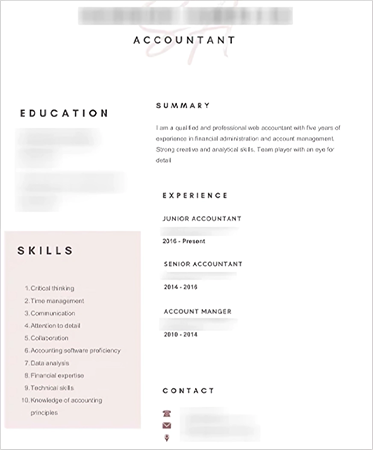
2. Business operations
| Soft Skills | Hard Skills |
|---|---|
| Conflict resolution | Project management |
| Emotional Intelligence | Data analysis |
| Interpersonal skills | Budgeting |
| Strategic thinking | Legal and compliance knowledge |
| leadership | Reporting |

3. Software development
| Soft Skills | Hard Skills |
|---|---|
| Time management | Database management |
| Critical thinking | Software development tools |
| Collaboration/ teamwork | Cloud computing |
| Communication | Data structure |
| Attention to the details | Programming languages |
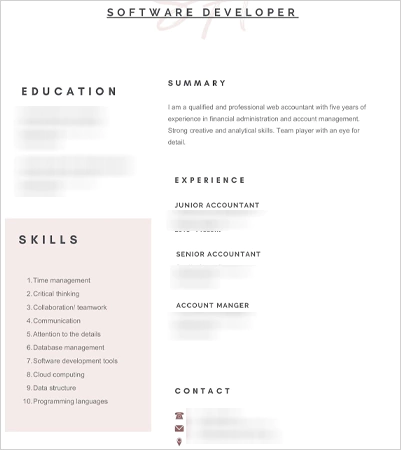
4. Customer services
| Soft Skills | Hard Skills |
|---|---|
| Communication | Product knowledge |
| Teamwork | Technical expertise |
| Multilingual skills | Data analysis and reporting |
| Active listening | Data management- surveys and feedback |
| Adaptability | Digital Literacy |
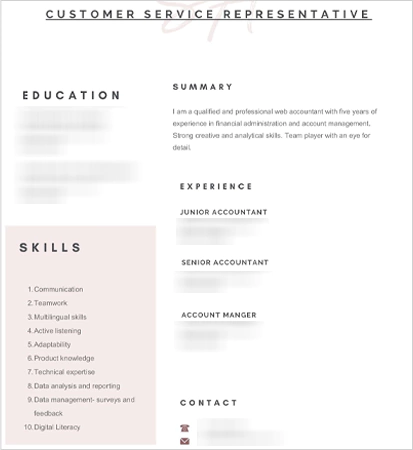
5. Data management
| Soft Skills | Hard Skills |
|---|---|
| Time management | Data governance |
| Collaboration | Data storage |
| Attention to detail | Data visualization |
| Problem solving | Data analysis |
| Critical thinking | Data software proficiency |
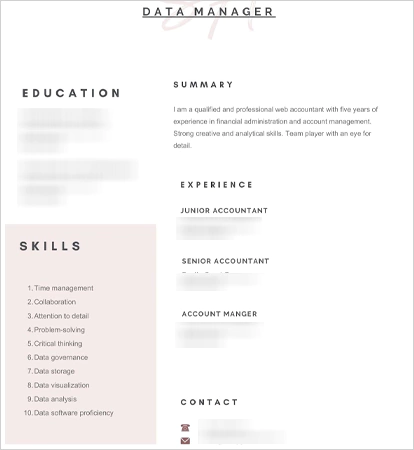
6. Finance
| Soft Skills | Hard Skills |
|---|---|
| Attention to detail | Financial modeling |
| Problem solving | Data analysis |
| Multitasking | Budgeting |
| Time management | Capital management |
| Critical Thinking | Reporting |
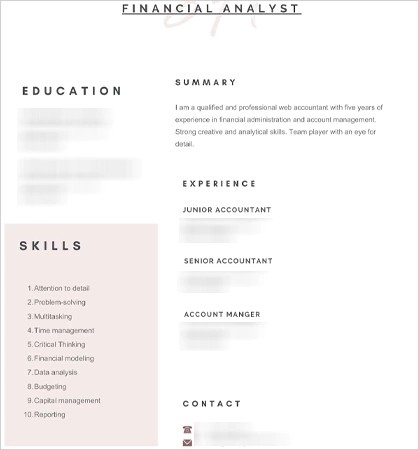
7. Health care and nutrition
| Soft Skills | Hard Skills |
|---|---|
| Communication skills | Research |
| Stress management | Nutrition education |
| Critical thinking | Nutrition planning |
| Adaptability | Therapy proficiency |
| Empathy and compassion | Nutritional assessment |
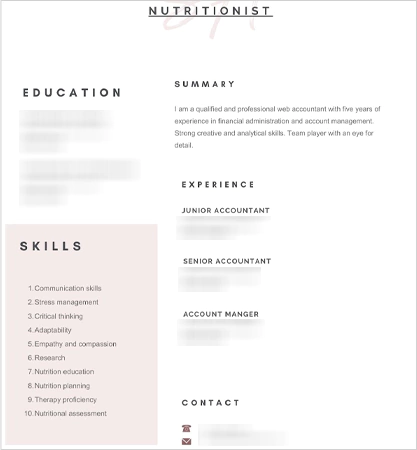
8. Human Resource Manager
| Soft Skills | Hard Skills |
|---|---|
| Research | Knowledge of employment laws and compliance |
| Strategic thinking | HR information system awareness |
| Communication skills | Performance management |
| Negotiation | Data analysis and reporting |
| Decision making | Project management |
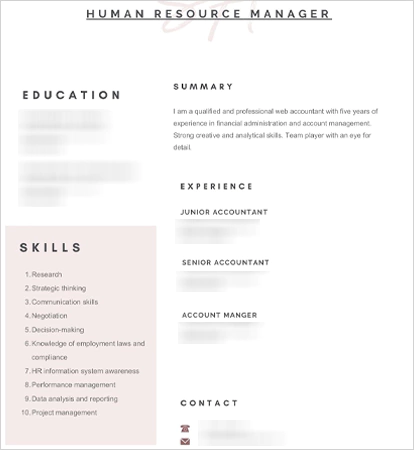
9. IT
| Soft Skills | Hard Skills |
|---|---|
| Problem solving | Software and tool knowledge |
| Creativity and innovation | Networking |
| Collaboration | Technical proficiency |
| Teamwork/ collaboration | Programming |
| Time management | Artificial intelligence and machine learning |
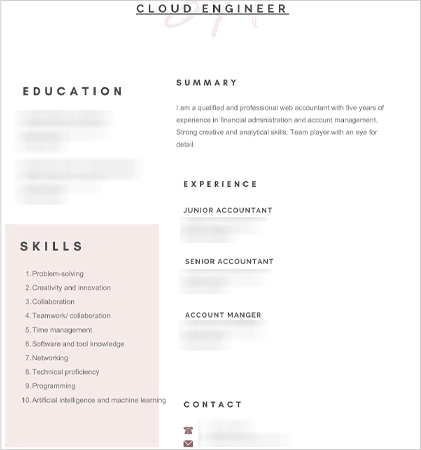
10. Marketing
| Soft Skills | Hard Skills |
|---|---|
| Leadership | Project management |
| Persuasion | Content marketing |
| Emotional intelligence | Data analysis |
| Creativity | Marketing analytics |
| Problem solving | Graphic designing |
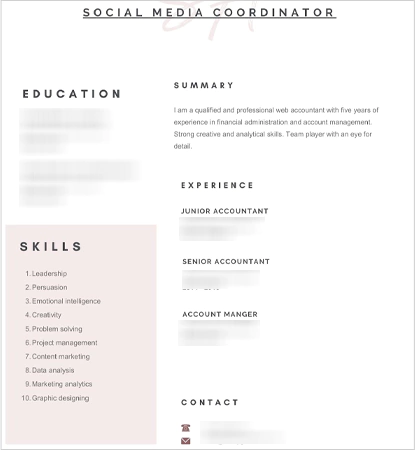
After understanding these skills holistically, the next thing to address is how to ingrain them into the resume to make the best out of them.
How to Use These Best Skills to Put on a Resume?
The above skills are to give you an idea about the best skills to put on a resume to make it more impressive and magnificent. However, solely mentioning them won’t serve the purpose. To suffice them, here we have a few-step process to follow and make full use of it.
This process has been described through the following infographic to simplify imbibing the essence of these skills.
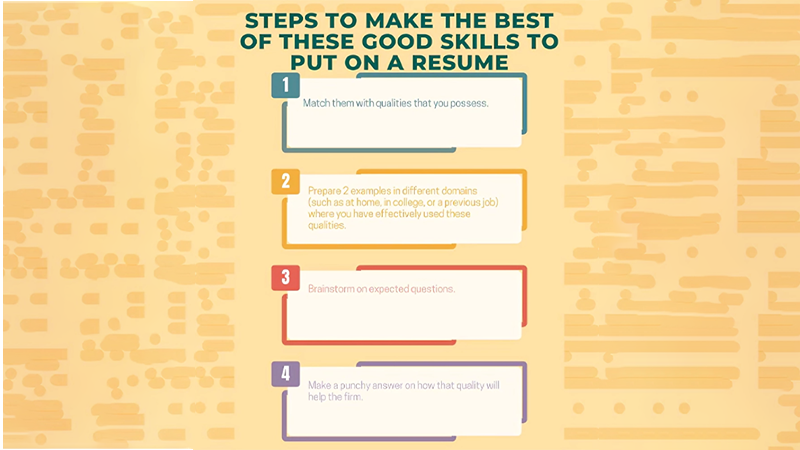
These simple steps will prepare you to defend your ground during the interview and will boost your chances of selection for the respective designation.
Conclusion
All the above-mentioned qualities are sufficient to depict the best skills to put on a resume. These abilities are easier to trace, inculcate, and sharpen. The few-step method provided above will help you in preparing for the interview and tackling the questions regarding them. It is also advised to add a few hard qualities as well to balance the skill sets in the resume.
Read Next: HR Full Form, Roles, Responsibilities, and Challenges Explicitly Explained
FAQs
1. What is the difference between hard skills and soft skills?
Ans: Hard skills are those that can be measured or assessed through certain parameters such as qualifications, certificates, or tests. On the flip side, soft skills are abstract qualities and hard to measure or objectively scale.
2. What are the 5 good skills to put on a resume?
Ans: The 5 good skills to put on the resume are communication skills, leadership, management quality, creativity and innovation, and time management.
3. What goes into the skills section of a resume?
Ans: The skill section of the resume should contain some soft skills (such as time management, critical thinking, etc.) and some hard skills (like software development and website management).
4. Is hard work a skill?
Ans: Yes, hard work is a skill. However, you must prove it and provide logical and sensible examples supporting it in the interview.